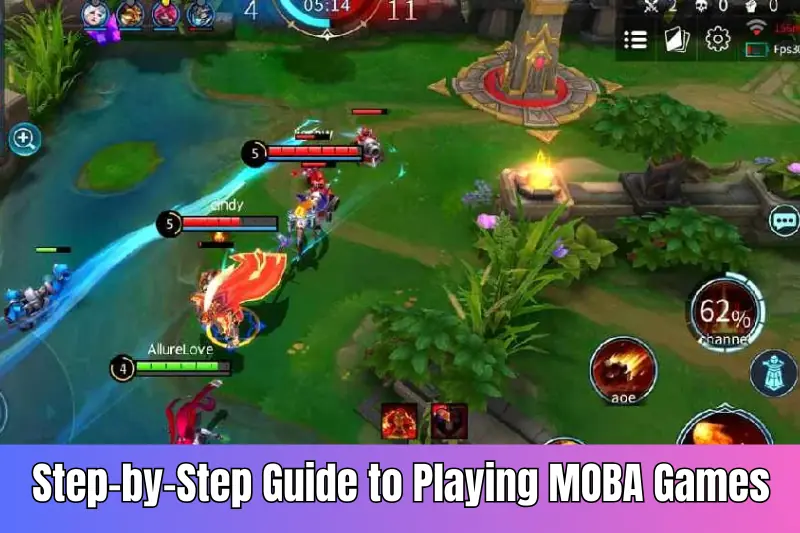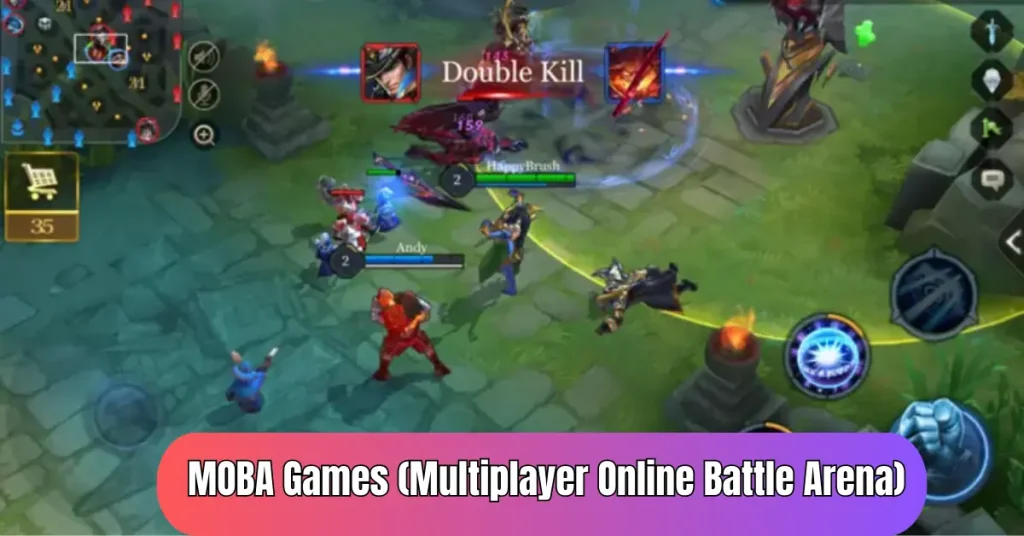Introduction
MOBA games, or Multiplayer Online Battle Arenas, have become one of the most exciting and popular types of games in the world. You’ve probably heard of games like League of Legends or Dota 2, but what exactly makes these games so special? In simple terms, MOBAs are games where teams of players compete against each other in fast-paced, action-packed battles. Each player controls a unique character, and the goal is to work together with your team to defeat the enemy. MOBA Games (Multiplayer Online Battle Arena)
What sets MOBA games apart from others is the blend of strategy, teamwork, and skill needed to win. Whether you’re a newbie or a seasoned player, the thrill of making strategic plays and the satisfaction of working together with your team make these games incredibly fun. So, if you’re ready to learn more about what makes MOBA games so exciting, let’s dive in!
What is MOBA Games (Multiplayer Online Battle Arena)?

- Genre Overview: MOBA stands for Multiplayer Online Battle Arena, a type of online game where two teams of players battle against each other.
- Team-Based Gameplay: Players are typically grouped into teams (usually 5v5) and work together to achieve victory by defeating the opposing team.
- Character Control: Each player controls a single character (called a champion or hero) with unique abilities, strengths, and playstyles.
- Objective: The main goal is to destroy the enemy team’s main structure (e.g., Nexus or Ancient) while defending your own.
- Map Layout: Games are typically played on a three-lane map with neutral areas (jungles) and defensive towers. Each lane is full of minions that fight for your team.
- Strategy and Coordination: Success depends on teamwork, strategic planning, and executing strategies like timing attacks, coordinating objectives, and controlling key map areas.
- Character Progression: Players earn gold and experience during the game, allowing them to buy items and level up their character’s abilities.
- Variety of Roles: Characters are usually divided into roles like tank, damage dealer, support, or mage, with each playing a specific part in the team’s strategy.
- Objective-Based Gameplay: Besides defeating enemies, players also aim to capture objectives, destroy turrets, and defeat powerful monsters for extra advantages.
You also may like it:
Pakistan Today: Your Go-To Source for Credible Information
Warid 1-Hour Call Package – Complete Information
Everything You Need to Know About Ufone Call Packages
Why is MOBA Games Important?
MOBA games have had a significant impact on the gaming world, both in terms of gameplay and culture. Here’s why they are so important:
Encourage Teamwork and Collaboration
- Team-Based Strategy: Unlike many solo games, MOBA games require players to work together to succeed. This fosters cooperation and enhances communication skills.
- Shared Goals: Players learn to work towards a common goal—winning as a team rather than focusing on individual performance.
- Collaboration Across Roles: Each team member plays a specific role (e.g., tank, damage dealer, support), requiring strong coordination to create an effective strategy.
Strategic Depth and Critical Thinking
- Complex Decision Making: Every action in a MOBA requires careful planning, from choosing when to attack to deciding which objectives to prioritize.
- Adaptability: Players must constantly adjust their strategies based on the ever-changing dynamics of the game, keeping their minds sharp.
- Long-Term Strategy: Success isn’t just about short-term victories but also about planning for the late game and anticipating the enemy’s moves.
Thriving Esports and Competitive Scene
- Global Tournaments: Popular MOBAs like League of Legends and Dota 2 have huge esports followings with multi-million-dollar prize pools, drawing in competitive players from around the world.
- Community Engagement: The competitive nature of MOBA games has built dedicated fan bases, with millions watching tournaments online and attending live events.
- Career Opportunities: Players can turn their passion for MOBA games into careers in sports, content creation, and game development.
Accessible Yet Challenging
- Free-to-Play Model: Most MOBA games are free to play, lowering the barrier for new players to join and experience the genre.
- Skill Progression: MOBAs offer a clear progression for players to improve. Whether you’re a beginner or a seasoned player, there’s always room for growth.
- Balance Between Casual and Competitive: MOBAs can be enjoyed by both casual players who play for fun and hardcore gamers who compete for glory.
Cultural Impact
- Influence on Game Design: The success of MOBAs has inspired other game genres, with many new titles incorporating MOBA-like mechanics.
- Community and Social Interaction: MOBAs promote social interaction, whether it’s teaming up with friends or joining online communities. They connect players globally.
- Pop Culture: Some characters and champions from popular MOBAs have become iconic, influencing everything from memes to fan art and cosplay.
Mental and Cognitive Benefits
- Problem-Solving Skills: The need for quick thinking and adapting to in-game situations helps improve problem-solving abilities.
- Multitasking: Players must balance numerous elements during a match, such as monitoring the map, tracking resources, and managing team strategies.
- Focus and Attention: The fast-paced action in MOBAs requires intense focus, helping to improve attention span and concentration.
Step-by-Step Guide to Playing MOBA Games

Step 1: Choose Your MOBA Game
- Select a Game: Choose a popular MOBA like League of Legends, Dota 2, Smite, or Mobile Legends. Some games are PC-based, while others are available on mobile devices.
- Check System Requirements: Make sure your device meets the game’s requirements (for PC games, ensure your computer can handle the graphics and gameplay).
Step 2: Create an Account and Set Up Your Profile
- Sign Up: Register an account with the game’s official platform (e.g., Riot Games for League of Legends or Valve for Dota 2).
- Customize Your Profile: Add your gamer tag, set your profile picture, and explore the available customization options.
- Adjust Game Settings: Before starting, tweak the settings (controls, graphics, sound, etc.) for optimal comfort.
Step 3: Understand the Basics of the Game
- Game Objective: Know the primary goal of the game—typically, you’ll need to destroy the enemy’s main base (Nexus, Ancient) while protecting yours.
- The Map: Familiarize yourself with the layout of the map. Most MOBAs have three lanes (top, middle, bottom) with jungles in between where neutral monsters spawn.
- Minions and Turrets: In most MOBAs, minions are AI-controlled units that help push the lanes. Turrets defend each lane, and you must destroy them to move forward.
Step 4: Learn the Roles and Heroes/Champions
- Champion Selection: Each player controls a unique character (champion or hero). Start by playing simple champions to understand their abilities and roles.
- Champion Roles: Learn the different roles, such as:
- Carry (DPS): Deals high damage.
- Tank: Absorbs damage and protects teammates.
- Support: Helps teammates with healing, buffs, or crowd control.
- Jungler: Focuses on neutral monsters in the jungle and assists in ganking (attacking enemy players from behind).
- Mage: Deals damage using magic abilities.
Step 5: Understand the Core Mechanics
- Gold and Experience: Earn gold by killing minions, enemies, and completing objectives. Use gold to buy items that enhance your champion’s abilities. Experience levels up your champion, unlocking new powers.
- Abilities and Items: Every champion has active abilities and can purchase items that enhance stats like attack power, defense, or mobility.
- Objectives: Apart from fighting, objectives like killing neutral monsters or destroying towers help push the game in your favor.
Step 6: Play Practice Matches
- Start with AI Bots: Begin with AI-controlled matches to get used to the mechanics without the pressure of real players.
- Learn the Map: Explore the map to understand where objectives, jungles, and turrets are located. Practice last-hitting minions to earn gold and experience efficiently.
Step 7: Join Multiplayer Matches
- Play with Friends: Start by playing with friends or low-level players to get used to real-time battles and team dynamics.
- Communicate: Use the game’s chat or voice features to communicate with your teammates. Teamwork is essential for winning MOBA games.
- Focus on Objectives: Work with your team to destroy turrets, capture key areas, and defeat enemy heroes. Don’t just focus on kills—objectives win games.
Step 8: Master Your Role and Champion
- Focus on One Role: As a beginner, focus on mastering one role (e.g., a tank or carry) before trying to play all roles. This will help you understand the importance of teamwork.
- Learn Champion Abilities: Understand your chosen champion’s abilities and combos to maximize effectiveness. Experiment in practice modes to get comfortable.
Step 9: Develop Teamwork and Strategy
- Team Coordination: MOBAs require strong communication and collaboration. Work with your team to set up attacks, defend your base, or secure objectives.
- Adapt Your Strategy: Be ready to change your approach based on how the game is going. If the enemy team is stronger, focus on defense or farming until you are ready to fight.
- Gank and Assist: Help your teammates by ganking (surprising enemies with attacks) and supporting them during battles.
Step 10: Review and Learn from Your Matches
- Analyze Your Games: After each match, review what went well and what could be improved. Learn from your mistakes and apply strategies to future games.
- Watch High-Level Players: Watch professional streams or replays to learn new tactics and champion strategies from expert players.
Step 11: Climb the Ladder and Compete
- Ranked Mode: Once you feel confident, try Ranked mode to test your skills against better players and climb the competitive ladder.
- Stay Consistent: Keep practicing, and stay patient. Progress in MOBA games takes time, but each match is an opportunity to improve.
Advantages of MOBA Games
Teamwork and Collaboration
- Improved Communication: Playing in teams teaches you how to communicate effectively, especially in high-pressure situations.
- Collaborative Strategy: MOBAs require strong coordination with your team, encouraging players to develop team-building and leadership skills.
Strategic Gamepla
- Complex Strategy: The depth of strategy in MOBA games keeps players engaged, as every decision impacts the outcome.
- Skill Development: Playing MOBA games helps develop problem-solving, critical thinking, and multitasking abilities as you juggle different aspects of the game.
High Replay Value
- Diverse Characters and Roles: With a wide range of characters (champions/heroes) to choose from, each match offers a fresh experience.
- Dynamic Gameplay: The ever-changing nature of the game, where tactics and situations shift, ensures no two games are the same.
Competitive and Social Environment
- Esports Scene: MOBA games have massive esports tournaments, which provides a platform for competitive players to showcase their skills and potentially earn money.
- Global Community: Players from around the world connect, allowing for social interaction, forming teams, and enjoying a global community.
Free-to-Play Model
- Accessibility: Many popular MOBAs, like League of Legends or Dota 2, are free to play, making them accessible to a wide audience without upfront costs.
- Low Barrier to Entry: New players can start the game without spending money, though optional in-game purchases are available for cosmetic items.
You also may like it:
PSL 2025 Draft Players: Complete List And Analysis
Board Games Online – Detailed Guide!
Where to Find Gucci Shirts in Pakistan: Your Ultimate Shopping Guide
Disadvantages
Steep Learning Curve
- Complexity: The mechanics and strategies can be overwhelming for beginners, as MOBAs require a deep understanding of roles, characters, and the map.
- Time Investment: Mastering a game and improving your skills takes a lot of practice, which can be time-consuming.
Toxic Community
- Negative Behavior: Some players can be very competitive and resort to toxic behaviors such as flaming, trolling, or blaming teammates for losses.
- Pressure to Perform: With high expectations in ranked games, players might experience stress or frustration, especially if they encounter rude or unhelpful teammates.
Dependency on Team Performance
- Team Dynamics: Success in MOBA games is heavily reliant on the performance of your teammates. Even if you play well, a poor teammate can lead to a loss.
- Unpredictable Outcomes: Randomness or mistakes made by teammates (e.g., AFK players or bad decisions) can negatively impact the match.
In-Game Purchases
- Pay-to-Win Concerns: While most MOBAs are free to play, some offer in-game purchases for cosmetic items or advantages. This can create a sense of inequality between paying and non-paying players.
- Microtransactions: Some players may feel pressured to buy skins or items to keep up with the latest trends or appearances, despite these items not affecting gameplay.
Addictiveness
- Time-Consuming: MOBAs can become addictive, with matches taking anywhere from 20 minutes to over an hour. This can take up a lot of free time.
- Over-Engagement: The desire to improve and win can cause some players to overcommit to playing, leading to fatigue or burnout.
Common FAQs about MOBA Games
What does MOBA stand for?
MOBA stands for Multiplayer Online Battle Arena. It’s a genre of video games where players control characters (called heroes or champions) in team-based matches, aiming to defeat the opposing team.
Are MOBA games free to play?
Many popular MOBA games, like League of Legends and Dota 2, are free to play. However, they offer in-game purchases for cosmetic items like skins, which don’t affect gameplay but allow you to customize your character.
What is the goal of a MOBA game?
The main goal in most MOBAs is to work with your team to destroy the enemy team’s base (like the Nexus or Ancient) while protecting your own. Players also complete smaller objectives, such as destroying turrets and defeating neutral monsters, to gain advantages.
How do you win a MOBA game?
To win, your team must destroy the enemy’s main building (Nexus, Ancient, or equivalent), usually by pushing through lanes and taking down defensive turrets, minions, and enemy champions along the way.
What roles are there in MOBA games?
There are typically five main roles:
Carry (DPS): Deals high damage and is crucial for winning team fights.
Tank: Absorbs damage and protects other teammates.
Support: Helps the team with healing, buffs, or crowd control.
Jungler: Focuses on neutral monsters and helps the team by “ganking” (surprising the enemy in other lanes).
Mage: Deals magical damage, usually from a distance.
Are MOBA games easy to learn?
MOBA games can be challenging to learn because of their deep mechanics, multiple roles, and strategic elements. However, by playing beginner levels, practicing, and learning from others, you can improve over time.
Do I need a team to play a MOBA?
While it’s best to play with friends for better coordination, you can still play with random teammates in team-based matches. However, teamwork and communication are crucial to success.
How long does a typical MOBA match last?
A typical match lasts anywhere from 20 minutes to 45 minutes depending on how well the teams are performing. Some matches may last even longer if the game is closely contested.
Can I play MOBA games on my mobile device?
Yes, some MOBAs, like Mobile Legends and Arena of Valor, are designed for mobile devices. They offer a similar experience to PC MOBAs but with controls optimized for touchscreens.
What should I focus on as a beginner in MOBA games?
As a beginner, focus on learning the basics: understanding the map, the role of your champion, and the importance of objectives (like turrets and neutral monsters). Try starting with easier champions and play practice games to improve your skills.
Conclusion
MOBA games are exciting and offer a unique mix of strategy, teamwork, and skill. Whether you’re playing for fun or aiming to improve, there’s always something new to learn.
While they may have a steep learning curve, with practice, you can become a pro. Remember to communicate with your team, enjoy the game, and have fun while playing!
Bonus Points
- Regular Updates: Most popular MOBA games receive frequent updates with new characters, skins, and balance changes, keeping the game fresh and exciting.
- Community Support: There’s a huge online community, with plenty of forums, guides, and tutorials to help you improve your skills.
- Cross-Platform Play: Some MOBAs allow you to play across different platforms, so you can team up with friends, whether they’re on PC, console, or mobile.
- Skill Progression: As you play more, you can unlock new abilities and strategies, providing a sense of growth and accomplishment.
- Tournaments and Rewards: Many MOBAs have esports tournaments where you can compete for prizes, and some games even offer rewards for in-game achievements.
You also may like it:
Explore Zong Call Packages Affordable & Flexible
APKZub GTA 5: A Complete Guide To Download And Install The Game (2025 Edition)

